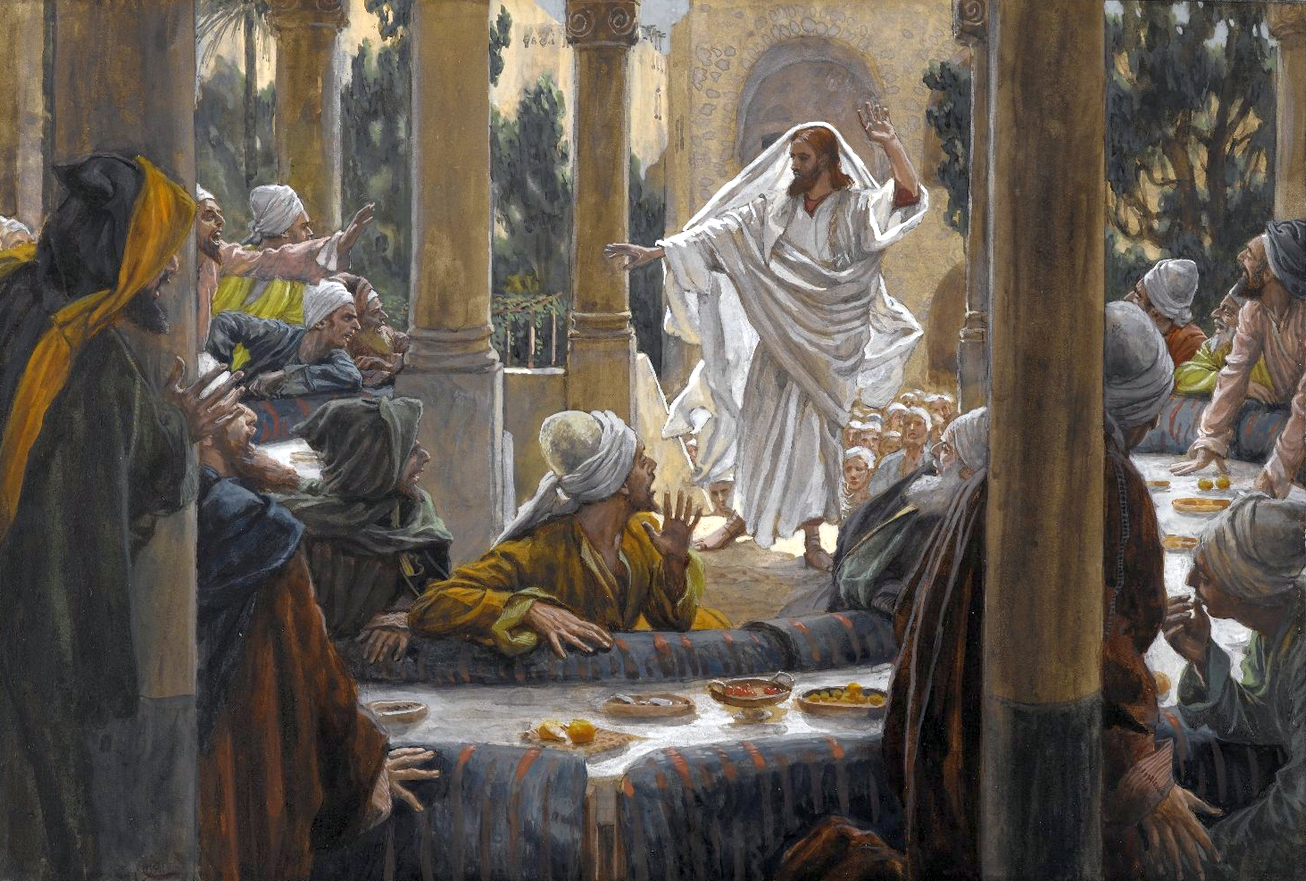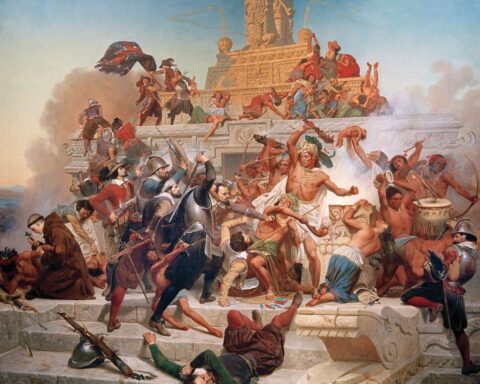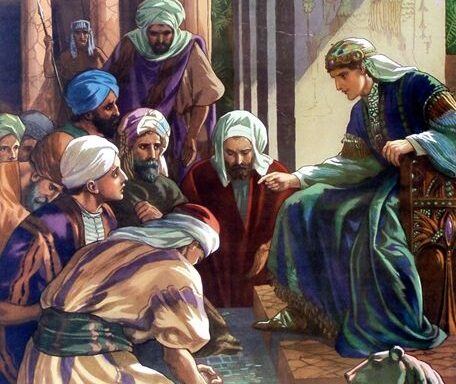
Editor’s note: The following comprises the fifth chapter, first part (A8), of The Gospel of Luke: An Exposition, by Charles R. Erdman (published 1936). All spelling in the original.
8. Pharisaism Exposed and Denounced (11:37-54)
___________________________________________________
37 Now as He spake, a Pharisee asketh Him to dine with him: and He went in, and sat down to meat. 38 And when the Pharisee saw it, he marvelled that He had not first bathed himself before dinner. 39 And the Lord said unto him, Now ye the Pharisees cleanse the outside of the cup and of the platter; but your inward part is full of extortion and wickedness. 40 Ye foolish ones, did not He that made the outside make the inside also? 41 But give for alms those things which are within; and behold, all things are clean unto you. 42 But woe unto you Pharisees! for ye tithe mint and rue and every herb, and pass over justice and the love of God: but these ought ye to have done, and not to leave the other undone. 43 Woe unto you Pharisees! for ye love the chief seats in the synagogues, and the salutations in the marketplaces. 44 Woe unto you! for ye are as the tombs which appear not, and the men that walk over them know it not. 45 And one of the lawyers answering saith unto him, Teacher, in saying this thou reproachest us also. 46 And He said, Woe unto you lawyers also! for ye load men with burdens grievous to be borne, and ye yourselves touch not the burdens with one of your fingers. 47 Woe unto you! for ye build the tombs of the prophets, and your fathers killed them. 48 So ye are witnesses and consent unto the works of your fathers: for they killed them, and ye build their tombs. 49 Therefore also said the wisdom of God, I will send unto them prophets and apostles; and some of them they shall kill and persecute; 50 that the blood of all the prophets, which was shed from the foundation of the world, may be required of this generation; 51 from the blood of Abel unto the blood of Zachariah, who perished between the altar and the sanctuary: yea, I say unto you, it shall be required of this generation. 52 Woe unto you lawyers! for ye took away the key of knowledge: ye entered not in yourselves, and them that were entering in ye hindered. 53 And when He was come out from thence, the scribes and the Pharisees began to press upon Him vehemently, and to provoke Him to speak of many things; 54 laying wait for Him, to catch something out of His mouth.
___________________________________________________
The conflict between Jesus and His enemies here reached its climax. He rebuked their hypocrisy, and pronounced upon them six solemn woes. His words are full of warning for His followers in all ages; religion ever tends to become a matter of form and ritual; hypocrisy is often unconscious; its practice is almost universal.
A Pharisee whose heart was foul with sinful thoughts wondered that Jesus had sat down to eat without first washing his hands according to the Jewish ritual. No such ceremony was required by the Law, but only by the traditions upon which the Pharisees laid such stress. Jesus declared that to wash the body while the heart is impure is as absurd as to cleanse the outside of an unclean cup or platter. He declared that God who made the body created the soul also, and that God is more concerned with the latter than with the former. He insisted that while it may be well to wash the hands, a better preparation for a meal would consist in filling the heart with love, which might be expressed in gifts to the poor. It was much more important that the Pharisee should take the hatred from his heart, than that Jesus should wash his hands. Vs. 37-41.
Hypocrisy, however, is ever concerned with external forms while disregarding realities. Therefore Jesus pronounced a woe upon the Pharisees for tithing the small garden herbs while neglecting justice toward men and love toward God, for observing some minute religious rite while breaking all the Ten Commandments. Yet He did not condemn them for caring for these trifles, but for neglecting things essential. “These ought ye to have done, and not to leave the other undone.” V. 42. Jesus further rebuked the vanity and the desire for prominence and public recognition which is at once a mark and a cloak of hypocrisy. V. 43. He further compared the evil influence of hypocrites to the defiling contact with a grave, which is level with the ground, upon which one may unconsciously tread and so become ceremonially unclean. Men are not on their guard against those who make loud boasts of religion. V. 44.
At this juncture a lawyer interrupted Jesus with the statement that these severe denunciations seemed to include him and his associates. It was true that most lawyers were Pharisees, but they were the professional teachers of this sect, the recognized leaders of the party; and in denouncing all Pharisees Jesus seemed to include even these proud expounders of the Law. Jesus replied that religious teachers who are insincere, or who allow their religion to become a mere matter of form, are most of all to be rebuked. He pronounced upon them three woes: the first, for extracting from the Law minute and burdensome requirements which they were not careful to observe themselves. It is a grievous fault for students and scholars to make religion a matter of weariness and distaste, instead of a delight to the common people. Vs. 45, 46.
Secondly, Jesus rebuked their heartless cruelty and fanaticism. Teachers of religion are ever tempted to become bitter partisans, and even to have a share in killing the very prophets and apostles of God. The hatred of Jesus shown by His enemies was like that of their fathers who had killed the divine messengers of old. The blood of these martyrs, from the first to the last mentioned in the Hebrew Bible was yet to be required of the nation, and those who rejected Jesus would partake in the judgment as they were partakers of the crime, vs. 47-51.
Lastly, the lawyers were rebuked for keeping back the knowledge of God, by their false interpretations of Scripture and their disregard of the real spiritual needs of the people. Such teachers of religion are like men who hold the key to a sacred temple; they themselves will not enter and they keep back all who would. It is a solemn responsibility to be a professed teacher of divine truth; and to be at once a “lawyer” and a “hypocrite,” is to merit these solemn woes which fell from the lips of Christ. So enraged were His hearers that they threatened Him with physical violence. Hypocrites hate to be exposed. Wise men are glad to be warned and to repent before it is too late. He who spoke these bitter words of rebuke is ready to pardon and to purify and to lead His followers in the paths of service and of peace. Vs. 52-54.
(Go back to previous chapter)
(Continue to next chapter)

The Gospel of Luke: An Exposition (Luke 11:37-54)
2 Comments
Leave a Reply
Latest from Religion

The Weimar Years – Part 1
This started out as an attempt to better understand Weimar Germany by chronicling my reactions to the audiobook version of “The Weimar Years: Rise and Fall 1918-1933” by Frank McDonough. Writing my

Alfredus Rex Fundator
"Alfred was a Christian hero, and in his Christianity he found the force which bore him, through calamity apparently hopeless, to victory and happiness."

The Story of Cortez
It seemed to me that, having to speak tonight to soldiers, that I ought to speak about soldiers. Some story, I thought, about your own profession would please you most and teach

The Coming of the Friars
When King Richard of England, whom men call the Lion-hearted, was wasting his time at Messina, after his boisterous fashion, in the winter of 1190, he heard of the fame of Abbot

“Joseph” by Charles Kingsley
Editor’s note: The following is extracted from The Works of Charles Kingsley, Vol. 25 (published 1885). (Preached on the Sunday before the Wedding of the Prince of Wales. March 8th, third Sunday




[…] (Go back to previous chapter) (Continue to next chapter) […]
[…] (Go back to previous chapter) (Continue to next chapter) […]